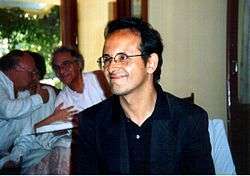Francisco Varela

Francisco Javier Varela García (September 7, 1946 – May 28, 2001) was a Chilean biologist, philosopher, and neuroscientist who, together with his teacher Humberto Maturana, is best known for introducing the concept of autopoiesis to biology, and for co-founding the Mind and Life Institute to promote dialog between science and Buddhism.
Life and career
Varela was born in 1946 in Santiago in Chile, the son of Corina María Elena García Tapia and Raúl Andrés Varela Rodríguez.[1] After completing secondary school at the Liceo Aleman del Verbo Divino in Santiago (1951–1963), like his mentor Humberto Maturana, Varela first studied temporarily medicine at the Pontifical Catholic University of Chile to graduate in biology at the University of Chile, and later obtain a Ph.D. in biology at Harvard University. His thesis, defended in 1970 and supervised by Torsten Wiesel, was titled Insect Retinas: Information processing in the compound eye.
After the 1973 military coup led by Augusto Pinochet, Varela and his family spent 7 years in exile in the United States before he returned to Chile to become a professor of biology.
Varela became a Tibetan Buddhist in the 1970s, initially studying, together with Keun-Tshen Goba (né Ezequiel Hernandez Urdaneta), with the meditation master Chögyam Trungpa Rinpoche, founder of Vajradhatu and Shambhala Training, and later with Tulku Urgyen Rinpoche, a Nepalese meditation master of higher tantras.
In 1986, he settled in France, where he at first taught cognitive science and epistemology at the École Polytechnique, and neuroscience at the University of Paris. From 1988 until his death, he led a research group at the CNRS (Centre National de Recherche Scientifique).
In 1987, Varela, along with R. Adam Engle, founded the Mind and Life Institute, initially to sponsor a series of dialogues between scientists and His Holiness The Dalai Lama about the relationship between modern science and Buddhism.[2] The Institute continues today as a major nexus for such dialog as well as promoting and supporting multidisciplinary scientific investigation in mind sciences, contemplative scholarship and practice and related areas in the interface of science with meditation and other contemplative practices, especially Buddhist practices.[3]
Varela died in 2001 in Paris of Hepatitis C after having written an account of his 1998 liver transplant.[4] Varela had four children, including the actress, environmental spokesperson, and model Leonor Varela.
Work
Varela trained as a biologist, fundamentally influenced by his teacher and fellow Chilean, Humberto Maturana. Both biologists had strong philosophical orientations.
He wrote and edited a number of books and numerous journal articles in biology, neurology, cognitive science, mathematics, and philosophy. He founded, with others, the Integral Institute, a thinktank dedicated to the cross-fertilization of ideas and disciplines.
Varela supported embodied philosophy, viewing human cognition and consciousness in terms of the enactive structures in which they arise. These comprise the body (as a biological system and as personally experienced) and the physical world with which it interacts. [5]
He introduced into neuroscience the concepts of neurophenomenology. This combined the phenomenology of Edmund Husserl and of Maurice Merleau-Ponty, with "first person science" . The outcome entails that observers examine their own conscious experience using scientifically verifiable methods.
See also
- Autopoiesis
- Cartesian anxiety
- Molecular Cellular Cognition
- Phenomenology
- Neurophenomenology
- Neurodynamics
Publications
Varela wrote numerous books and articles:[6]
- 1980 (with Humberto Maturana). Autopoiesis and Cognition: The Realization of the Living. Boston: Reidel.
- 1979. Principles of Biological Autonomy. North-Holland.
- 1987 (rev 92, 98) (with Humberto Maturana). The Tree of Knowledge: The Biological Roots of Human Understanding. Boston: Shambhala Press. ISBN 978-0877736424
- 1991 (with Evan Thompson and Eleanor Rosch). The Embodied Mind: Cognitive Science and Human Experience. MIT Press. ISBN 978-0-262-72021-2
- 1992 (with P. Bourgine, eds.). Towards a Practice of Autonomous Systems: The First European Conference on Artificial Life. MIT Press.
- 1992 (with J. Hayward, eds.). Gentle Bridges: Dialogues Between the Cognitive Sciences and the Buddhist Tradition. Boston: Shambhala Press.
- 1993 ( with D. Stein, eds.). Thinking About Biology: An Introduction to Theoretical Biology. Addison-Wesley, SFI Series on Complexity.
- 1997 (ed.). Sleeping, Dreaming and Dying. Boston: Wisdom Book.
- 1996-99. Invitation aux sciences cognitives. Paris: Seuil.
- 1999. Ethical Know-How: Action, Wisdom and Cognition. Stanford University Press.
- 1999 (with J. Shear, eds.). The View from Within: First-Person Methodologies in the Study of Consciousness. London: Imprint Academic.
- 1999 (with J. Petitot, B. Pachoud, and J-M. Roy, eds.). Naturalizing Phenomenology: Contemporary Issues in Phenomenology and Cognitive Science. Stanford University Press.
- 2002 (with A. Weber). 'Life after Kant: Natural purposes and the autopoietic foundations of biological individuality'. Phenomenology and the Cognitive Sciences I:97–125, 2002.
References
- ↑ http://familytreemaker.genealogy.com/users/v/a/r/Andrs-Varela/WEBSITE-0001/UHP-0015.html
- ↑ http://www.mindandlife.org/about/history/
- ↑ http://www.mindandlife.org/about/mission/
- ↑ "Intimate Distances - Fragments for a Phenomenology of Organ Transplantation"
- ↑ Varela, Francisco J., Thompson, Evan T., and Rosch, Eleanor. (1991). The Embodied Mind: Cognitive Science and Human Experience. Cambridge, MA: The MIT Press. ISBN 0-262-72021-3
- ↑ Comprehensive bibliography by Randall Whitaker.
Further reading
Sarat Maharaj & Francisco Varela in conversation: "Ahamkara". In: Florian Dombois, Ute Meta Bauer, Claudia Mareis, and Michael Schwab, eds. Intellectual Birdhouse: Artistic Practice as Research. London: Koenig, 2011. ISBN 978-3-86335-118-2.
External links
| Wikimedia Commons has media related to Francisco Varela. |
| Wikiquote has quotations related to: Francisco Varela |
- Intimate Distances An autobiographical essay written shortly before his death
- Francisco Varela: In memoriam:
- The Embodied Mind:
- Evan Thompson, coauthor.
- Eleanor Rosch, coauthor.
- Daniel Dennett, 1993, "Review of The Embodied Mind," American Journal of Psychology 106: 121-26.
- "Escher, enaction & intersubjectivity."
- "Why the mind is not in the head" The Cosmos Letter, Expo'90 Foundation, Japan
- Franz Reichle, 2004. Film Monte Grande - What is Life?